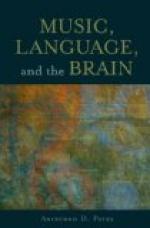The pupil should also keep a register, in which she notes the exact amount of time spent daily in practising, and the way in which she divides it. This book should be brought to each music lesson, and should also be shown to the supervising mistress at the end of each term.
CHAPTER XIV
SUGGESTIONS TO STUDENTS ON LEAVING
A TRAINING DEPARTMENT
In finishing a course of training along the lines we have been considering, it is well to take a bird’s-eye view of what has been done.
In all communal work the results fall roughly under two heads:
1. The getting of new ideas, and of new ways of presenting old ideas.
2. The development of character, due to the mixing with fellow students and with those who are directing the work.
So far as the actual work is concerned, stress has been laid on the following:
1. The necessity of considering music as a language.
2. Various methods for teaching in accordance with this idea.
3. The principle of the inclusion of the work in the regular curriculum of schools, with class treatment.
In the short space of one year, which is all that can be generally spared by the student, it is impossible for her to realize the full bearing of all that has been done. It is only when we see such work in perspective, after the lapse of a little time, when it has been possible to work out at leisure some of the practical points involved, that we can perceive all the ground covered.
Many students have experienced considerable difficulty at first in doing themselves what they have seen children do, who have been trained along these lines, i.e. to write down two-, three-, or four-part exercises in dictation, to transpose at sight, to extemporize without hesitation at the piano, &c. The feeling of working against time, of examinations to be passed, of discouragement at apparently slow progress, has possibly produced a state of mental indigestion, and the only cure for this is Time, the universal doctor.
The student is now at the point of entering a new sphere of work. The instrument has been sharpened. How is the application to be directed? A word of warning is necessary. The young and enthusiastic teacher, fresh from the inspiration of a year’s work with those interested in her development, is too often apt to be over-rigid in enforcing a new presentment of ideas.
‘This way, or no way!’ is her cry.
Now all sound educational work must possess an intrinsic quality of pliability: it must grow, expand, and be capable of development in a hundred ways. Small points of method must be adjusted to the particular class and pupil, and a generous recognition of the useful parts of other people’s ‘methods’ will be the surest way of obtaining recognition of our own ideals. Provided a firm attitude be maintained on essentials, it is often possible to compromise on minor details. Above all, an open mind must be preserved in the presence of advice, however inexperienced. Many a young teacher has failed in her first post because she has given the impression to those in authority that there is one, and one only, way in which she can do her work—one, and one only, possible scheme of division of classes and hours for lessons.




